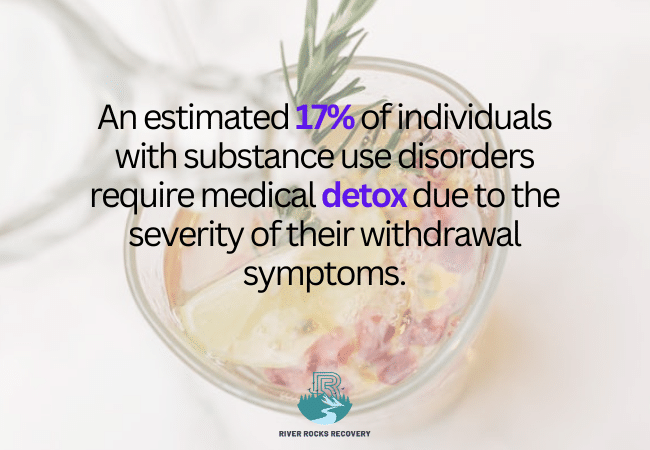Detoxification, often the first step in overcoming addiction, is a crucial phase in the journey toward recovery. However, it’s not without its challenges. One of the most concerning symptoms some individuals experience during detox is fever. Understanding the link between detoxing and fevers, and knowing how to navigate this phase safely, can make the journey smoother. This blog explores the connection and highlights how Addiction Treatment Programs like those offered at River Rocks Recovery can support individuals through this critical time.
The Connection Between Detoxing and Fevers
Detoxing involves the body’s natural process of eliminating harmful substances accumulated through substance use. During this phase, the body is under immense strain as it adjusts to functioning without these substances. This process can trigger withdrawal symptoms, including nausea, sweating, headaches, and, in some cases, fever.
Fever during detox can be the body’s way of responding to the stress of withdrawal or combating potential infections caused by weakened immunity. While mild fevers can be a natural part of the detox process, persistent or high fevers may indicate a more serious issue and require medical attention. That’s why medically supervised detox programs offered by an Addiction Treatment Center Ohio are essential to ensure safety and effective care.
Why Fevers Occur During Detox
Detoxification triggers significant changes in the body. When the brain and other systems have become dependent on substances like alcohol, opiates, or methamphetamines, their sudden absence can lead to withdrawal symptoms, including fever. Fevers occur because the body is in a heightened state of stress, attempting to rebalance itself and flush out toxins.
Common Causes of Fevers During Detox
- Alcohol Withdrawal Syndrome (AWS):
- Severe alcohol withdrawal can result in a condition called delirium tremens (DTs), which may include high fever, confusion, and seizures. AWS symptoms typically begin within 6–24 hours after the last drink.
- Opiate Withdrawal:
- While opiate withdrawal symptoms are rarely life-threatening, fever can develop as the body reacts to the absence of opioids like heroin, fentanyl, or prescription painkillers.
- Stimulant Withdrawal:
- Substances like methamphetamine or cocaine can cause fevers during detox as the body adjusts to reduced dopamine production and addresses physical stress.
- Dehydration or Infection:
- Withdrawal symptoms like vomiting, diarrhea, or excessive sweating can lead to dehydration, which may cause fever. Additionally, individuals with weakened immune systems may be prone to infections during detox.
Why a Comprehensive Approach Matters
Recovery isn’t just about abstinence; it’s about addressing the physical, mental, and emotional impacts of addiction. This is where a multi-faceted approach, including a Partial Hospitalization Program, can make a difference. Such programs provide intensive care during the detox phase, ensuring medical professionals monitor withdrawal symptoms and intervene promptly when needed.
Individuals experiencing fevers during detox often require a combination of medical treatment and emotional support. For instance, fever can exacerbate feelings of anxiety, making the withdrawal process even more challenging. A Partial Hospitalization Program bridges the gap between inpatient and outpatient care, offering structured support while allowing individuals to maintain some level of independence.
Post-Detox: The Role of Outpatient Support
Programs like Intensive Outpatient Programs and Outpatient Programs help individuals transition from structured treatment to everyday life. These programs provide therapy sessions, skill-building workshops, and peer support to help clients build resilience and cope with triggers.
An Intensive Outpatient Program offers more frequent therapy and support sessions, making it ideal for those needing a higher level of care. In contrast, an Outpatient Program is a flexible option for individuals balancing work, family, or school commitments while continuing their recovery journey. Both options provide a safety net, ensuring that challenges like post-acute withdrawal symptoms or emotional struggles don’t derail progress.
Symptoms That May Accompany Fevers During Detox
Fever is often part of a broader range of withdrawal symptoms. Depending on the substance, these symptoms may include:
- Alcohol Detox: Sweating, tremors, hallucinations, seizures, increased heart rate, and high blood pressure.
- Opiate Detox: Muscle aches, nausea, vomiting, diarrhea, anxiety, and restlessness.
- Stimulant Detox (Meth or Cocaine): Agitation, fatigue, insomnia, depression, and cravings.
- General Symptoms: Chills, headaches, dehydration, and rapid heartbeat.
Managing Fevers During Detox
While fevers during detox can be uncomfortable, they are often manageable with the right care. At River Rocks Recovery, we specialize in medical detox programs that monitor and address these symptoms in a safe and supportive environment.
Key Strategies for Managing Fevers
- Medical Supervision:
- Detoxing at a medical facility ensures that fevers and other symptoms are closely monitored by healthcare professionals. Severe cases can be addressed promptly, reducing risks.
- Hydration:
- Fevers increase the body’s fluid needs. Staying hydrated with water, electrolyte solutions, or broths is essential to prevent complications from dehydration.
- Medications:
- Over-the-counter medications like acetaminophen or ibuprofen may help reduce fever and alleviate discomfort. These should only be administered under the guidance of medical staff to avoid interactions or contraindications.
- Cooling Measures:
- Applying cool compresses, taking lukewarm baths, or using fans can help reduce body temperature and make patients more comfortable.
- Proper Nutrition:
- A nutrient-rich diet supports the body’s immune system and helps it recover from the strain of detox. Foods high in vitamins and minerals can aid in replenishing lost nutrients.
- Rest and Supportive Care:
- Adequate rest allows the body to focus its energy on healing. Calming environments, like those provided at River Rocks Recovery, foster relaxation and comfort during this challenging time.

Sober Living and Its Benefits
For many individuals, stepping into a Sober Living Program after detox provides a structured and supportive environment to rebuild their lives. These programs act as a transitional phase, offering a safe and substance-free living space while promoting accountability and community engagement.
Fever-related health issues during detox might leave individuals feeling vulnerable and discouraged, but a Sober Living Program can offer the time and support needed to regain confidence. By fostering independence while maintaining access to support networks, these programs help individuals focus on long-term wellness.
The Importance of Professional Treatment for Detox
Attempting detox at home can be dangerous, especially if symptoms like fever, seizures, or hallucinations occur. Professional treatment programs, like those offered at River Rocks Recovery, ensure that detox is safe, effective, and supportive.
Benefits of Professional Detox Programs:
- Medical Monitoring: Trained staff oversee withdrawal symptoms to manage complications promptly.
- Tailored Care Plans: Programs are customized to the individual’s needs, ensuring comprehensive support.
- Emotional Support: Therapeutic interventions help patients manage the emotional aspects of withdrawal.
- Continuity of Care: After detox, individuals can transition into longer-term recovery programs.
At River Rocks Recovery, we offer the following treatment options:
- Partial Hospitalization Program (PHP): Daytime treatment providing medical and emotional support.
- Intensive Outpatient Program (IOP): Flexible treatment options for those balancing recovery with daily life.
- Outpatient Program (OP): Support for individuals in the later stages of recovery.
- Addiction Therapy Programs: Individual, group, and family therapy to address the underlying causes of addiction.
When Fevers Indicate a Medical Emergency
While mild fevers are common during detox, certain symptoms may signal a medical emergency. Seek immediate medical attention if:
- The fever exceeds 103°F.
- Symptoms include severe dehydration, confusion, or hallucinations.
- There is rapid heart rate or chest pain.
- Seizures or loss of consciousness occur.
Why River Rocks Recovery Stands Out
At River Rocks Recovery, we understand that detoxing is more than just a physical challenge—it’s an emotional and mental journey as well. Our Addiction Treatment Center Ohio offers a sanctuary for healing, hope, and transformation.
Our programs, including Partial Hospitalization Programs, Intensive Outpatient Programs, and Sober Living Programs, are designed to meet individuals where they are in their recovery journey. Combining evidence-based therapies with holistic approaches, we address the root causes of addiction and help individuals rediscover their strengths.
With a compassionate team dedicated to fostering resilience and breaking down stigma, we provide an empathetic community where individuals can thrive. Whether it’s managing withdrawal symptoms like fever during detox or rebuilding life post-recovery, River Rocks Recovery offers unwavering support along the therapeutic path.
Rediscovering Wellness
Detoxing is a challenging but necessary step toward recovery. While symptoms like fever can be daunting, they are a reminder of the body’s effort to heal. Choosing the right support system is crucial in navigating this phase safely and successfully.
River Rocks Recovery stands as a beacon of hope, guiding individuals through every stage of recovery with expertise and compassion. From medically supervised detox to ongoing care through Outpatient Programs and Sober Living Programs, we ensure that no one walks the path to recovery alone. If you or someone you know is ready to take the first step, reach out to our Addiction Treatment Center Ohio today and embark on a journey toward a healthier, brighter future.
Final Thoughts
Detoxing is a vital step toward overcoming addiction, but it can come with challenges like fevers and other withdrawal symptoms. These symptoms, while often manageable, require professional care to ensure safety and comfort. At River Rocks Recovery, we provide expert medical detox and a full spectrum of recovery services, helping individuals reclaim their health and lives. Take the first step and contact us today at (888) 905-6281.
FAQ on Detoxing and Fevers
Why do fevers occur during detox?
Fevers during detox occur as the body works to eliminate toxins and adjust to the absence of addictive substances. They can also result from dehydration, infections, or withdrawal from alcohol, opiates, or stimulants.
Are fevers during detox dangerous?
Mild fevers are often manageable, but high fevers or those accompanied by severe symptoms like confusion or seizures may indicate a medical emergency and require immediate attention.
How can I manage a fever during detox?
Fevers can be managed with hydration, proper nutrition, medications like acetaminophen (under medical guidance), and cooling measures. Professional detox programs offer monitoring to ensure safety.
Can I detox at home if I develop a fever?
Detoxing at home is risky, especially if symptoms like fever or seizures occur. Medical detox under professional supervision is the safest way to manage withdrawal symptoms.
What programs at River Rocks Recovery support detox and recovery?
River Rocks Recovery offers medical detox and programs such as Partial Hospitalization Program, Intensive Outpatient Program (IOP), Outpatient Program (OP), and Addiction Therapy Programs for long-term recovery.




























